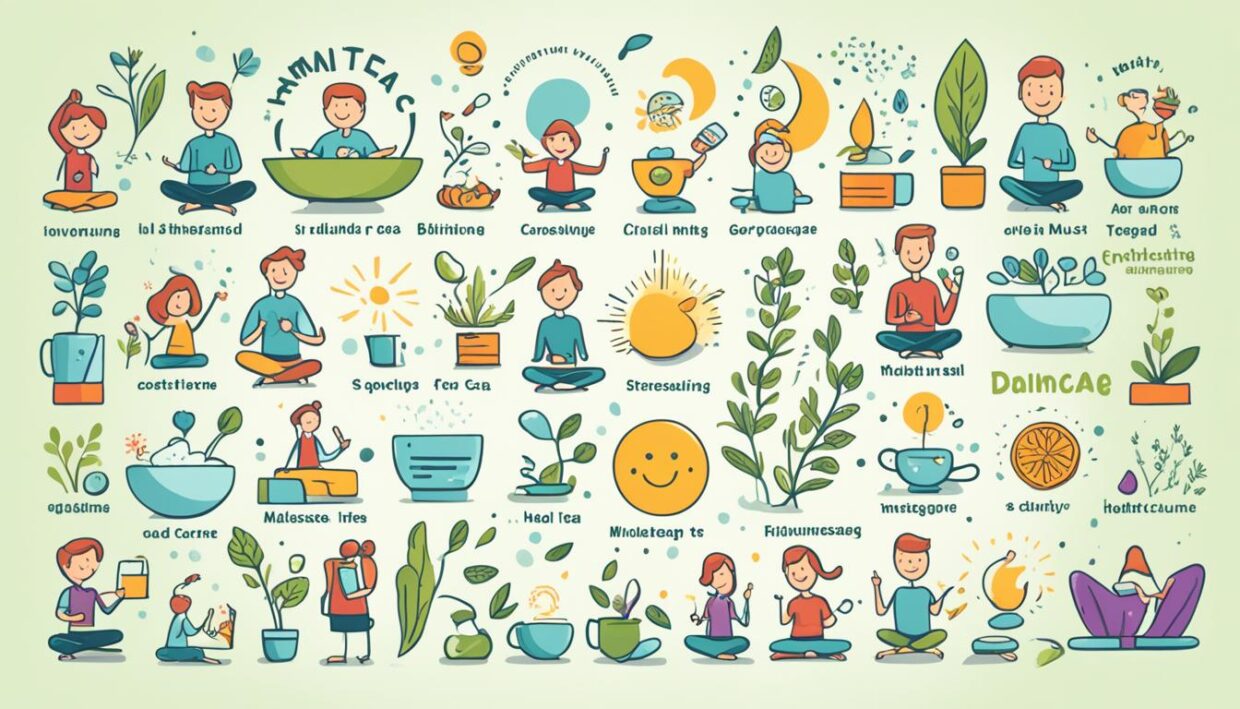
“Self-care is not a luxury. It is a necessity.” – Audre Lorde. This powerful insight encapsulates the essence of self-care, underscoring its critical role in achieving well-being and personal growth. In today’s fast-paced world, the notion of self-care often falls by the wayside, overshadowed by our daily responsibilities and challenges. Yet, taking the time to nurture your mind, body, and soul is fundamental for cultivating not just mental health, but a more fulfilling life overall.
Embracing self-care involves establishing routines that promote self-love and awareness, ultimately leading to enhanced physical health and emotional resilience. Research indicates that adults should aim for 7-9 hours of quality sleep each night to support optimal health, while maintaining a balanced diet rich in fruits, vegetables, and lean proteins can reduce the risk of chronic diseases.
Physical activity, mindfulness practices, and setting healthy boundaries are additional pillars of self-care that can improve mood, reduce stress, and foster a stronger sense of self. Combining these actions can significantly enhance your overall well-being and lead to a gratifying personal journey of growth and self-discovery.
Key Takeaways
- Prioritize quality sleep for improved well-being and productivity.
- Adopt healthy eating habits to reduce chronic disease risks.
- Engage in regular physical activity for better mental health.
- Incorporate mindfulness into your daily routine to alleviate anxiety.
- Establish healthy boundaries to enhance relationships and self-esteem.
- Make self-care rituals a consistent part of your life for better discipline.
Understanding Self-Care
Embracing a self-care definition rooted in holistic health reveals how critical it is for overall well-being. Self-care encompasses a range of activities designed to nurture both mental wellness and physical health. Engaging in self-care practices goes beyond occasional indulgences, representing a crucial daily commitment to one’s well-being.
Research indicates that self-care can dramatically affect mood and mental health. For instance, regular self-care routines have been clinically proven to reduce anxiety and depression, boosting happiness and energy levels. Prioritizing these practices can significantly enhance physical health, lower heart disease risks, and yield increased productivity at work. Consider that three in five employees experience adverse impacts from work-related stress, making self-care an essential tool for workplace effectiveness.
Furthermore, self-care plays a vital role in preventing burnout, especially for those in demanding professions like healthcare and social work. By taking time to recharge, individuals are better equipped to contribute positively to their work and relationships. Engaging in various self-care practices allows for increased self-esteem and self-worth, fostering a more resilient mindset.
It is encouraging that about 70% of Americans recognize their need for self-care. With growing awareness comes the opportunity to implement transformative self-care practices, ultimately leading to improved emotional, physical, and social wellness. Even minimal daily efforts in self-care can lead to profound changes in overall health and life satisfaction.
Importance of Nurturing Your Mind
Nurturing your mind is a crucial aspect of maintaining overall well-being. Engaging in practices that enhance mental well-being leads to a more positive mindset and equips individuals with tools to manage life’s challenges more effectively.
Practices to Enhance Mental Well-being
Adopting mindfulness practices can profoundly impact mental well-being. Techniques such as meditation, journaling, and positive affirmations promote relaxation and emotional stability. These activities help individuals connect with their inner selves, fostering a sense of calm even in tumultuous times. Regular engagement in these practices has been linked to lower levels of anxiety and depression.
Stress Management and Relaxation Techniques
Incorporating stress relief strategies into daily routines is essential for maintaining a healthy mental state. Common techniques include:
- Deep breathing exercises to alleviate anxiety
- Yoga for physical and mental relaxation
- Nature walks to enhance mood and provide clarity
- Breaking from technology to engage in meaningful, face-to-face interactions
These methods promote relaxation, allowing individuals to recharge. Studies suggest that practicing mindfulness can significantly improve emotional stability and resilience against stress. For those looking to enhance their mental well-being, prioritizing these techniques can lead to longer-lasting benefits.

| Practices | Benefits | Frequency Recommended |
|---|---|---|
| Meditation | Enhances focus, reduces stress | Daily |
| Yoga | Improves flexibility, promotes relaxation | 3-5 times a week |
| Journaling | Processes emotions, tracks progress | Weekly |
| Nature Activities | Boosts mood, enhances creativity | As often as possible |
By committing to these practices, individuals can build a foundation for long-term mental resilience, ultimately leading to improved quality of life and emotional health.
Caring for Your Body
Caring for your body plays a fundamental role in achieving overall well-being. It encompasses various aspects, including establishing a healthy skincare routine and prioritizing regular health check-ups. Implementing these practices can significantly enhance your physical health, laying a solid foundation for transformative wellness practices.
Establishing a Healthy Skincare Routine
A well-structured skincare routine involves several essential steps that help maintain healthy and glowing skin. Cleansing, moisturizing, and using sunscreen are the cornerstones of effective body care. Protecting the skin from UV rays and environmental stressors is crucial for preventing premature aging and maintaining vitality. Regularly following a tailored skincare regimen supports both aesthetic and health goals, enhancing confidence while contributing to a positive mindset.
Regular Health Check-ups
Incorporating regular health check-ups into your wellness practices is vital for preventive health. These appointments allow individuals to monitor their well-being and detect potential health issues early on. Regular visits to healthcare professionals provide opportunities to assess various aspects of physical health, promoting a proactive approach to disease prevention. Engaging in this practice not only safeguards physical fitness but also exemplifies a strong commitment to one’s health journey.

| Practice | Benefits |
|---|---|
| Skincare Routine | Promotes healthy skin, protects against damage |
| Regular Check-ups | Facilitates early detection, prevents chronic diseases |
Nourishing the Soul
Nourishing the soul plays a vital role in achieving spiritual wellness. Engaging in activities that promote spiritual growth can lead to profound emotional fulfillment and a deeper sense of purpose. Understanding the importance of connecting with nature and practicing mindfulness helps individuals cultivate a sense of inner peace and balance.
Connecting with Nature
Nature connection is essential for revitalizing both the mind and body. Spending just a short amount of time outdoors daily can significantly reduce stress levels and enhance mood. Immersing oneself in natural surroundings allows for healing and introspection, fostering a sense of calm. Activities such as walking in the park, hiking, or simply sitting by a tree can enhance self-awareness and promote mindfulness. Nature serves as a powerful reminder of life’s beauty and can easily recharge our emotional batteries.

Practices for Spiritual Growth
Incorporating mindfulness practices into daily routines encourages spiritual wellness. Techniques such as meditation, journaling, and self-reflection not only boost emotional fulfillment but also enhance clarity and purpose. Regular journaling promotes self-awareness and fosters resilience by helping individuals process their thoughts and feelings. Mindfulness practices focus on the present moment, leading to reduced stress and anxiety, while fostering an environment for personal growth. A combination of these practices encourages a holistic approach to nurturing the soul.
Creating Personal Care Rituals
Establishing personal care rituals plays a vital role in maintaining consistency within a self-care framework. These routines can be tailored to individual preferences, ensuring that each daily ritual resonates with the person engaging in it. Morning and evening rituals serve as essential bookends to the day, promoting a positive mindset and emotional balance.

Incorporating specific activities enhances these wellness practices. For instance, beginning the day with deep breathing exercises can increase oxygen flow and reduce anxiety. Mid-day self-care rituals, such as a brisk walk or a quick stretch, can combat afternoon sluggishness and boost creativity. Evening routines, including journaling or a warm bath, prepare the body for rest and improve overall sleep quality.
A valuable tool for identifying individual needs is the “Rate Your 8” self-assessment. This task helps one prioritize daily requirements and promote well-being. Journaling can further aid this process, ranging from freestyle writing to using guided prompts to inspire deeper reflection.
Consistency can be built through various grateful activities, which have proven effects on mental health. The commitment to a personal care routine that integrates practices like mediation or yoga provides unique benefits, including heightened self-awareness and emotional stability. Whether focusing on hydration by drinking 4-6 glasses of water daily or ensuring adequate sleep—as suggested by sleep expert Mark Wu—these small choices significantly impact overall wellness.
| Self-Care Rituals | Benefits |
|---|---|
| Morning Deep Breathing | Increases oxygen flow, stabilizes blood pressure |
| Mid-day Walk | Boosts creativity, clears the mind |
| Evening Journaling | Enhances mood, improves stress management |
| Warm Bath | Relaxation and muscle soothing |
| Meditation | Lowers stress, improves decision-making |
| Stretching | Relaxes muscles after a busy workday |
Ultimately, personal care rituals revolve around fostering a sustainable self-care journey. Prioritizing activities that bring joy and tranquillity is crucial in ensuring that these daily rituals become a lifelong practice, enhancing overall quality of life. Embracing these personalized self-care experiences paves the way for a more balanced, fulfilling existence.
Types of Self-Care
Understanding the various types of self-care is vital for maintaining a balanced life. Nurturing both physical and emotional health assists in developing resilience and overall well-being. The focus on different aspects of self-care provides tools to address unique needs and challenges. This section highlights physical self-care activities and the essential role of emotional and social self-care.
Physical Self-Care Activities
Engaging in physical self-care activities is crucial for fostering optimal well-being. Consider including the following practices in your routine:
- Regular exercise, which can boost mood and reduce feelings of burnout.
- Adopting a healthy diet rich in nutrients to enhance energy levels.
- Adequate sleep, allowing the body to recover and regenerate effectively.
Each of these activities contributes significantly to not only physical health but also emotional health. Incorporating them into daily routines can mitigate stressors and improve overall well-being.
Emotional and Social Self-Care
Emotional self-care emphasizes the importance of processing and expressing feelings. Activities such as gratitude journaling, therapy, and meditation are effective in managing emotions. These practices enhance personal and professional relationships through improved communication and understanding.
Social connections are equally important. Maintaining healthy relationships can be a source of joy and support. Engaging with loved ones or participating in community events fosters a sense of belonging and combats feelings of loneliness, which the CDC has linked to higher rates of depression and anxiety.
Creating a balanced self-care plan tailored to individual needs can serve as a protective measure against stress and burnout. Assessing personal stressors and establishing a routine can empower individuals to navigate challenges while promoting emotional health.

| Type of Self-Care | Activities | Benefits |
|---|---|---|
| Physical |
|
|
| Emotional |
|
|
| Social |
|
|
Incorporating Mindfulness into Your Lifestyle
Mindfulness has garnered significant attention for its capacity to promote self-awareness and enhance overall well-being. Practicing mindfulness allows individuals to engage more fully with the present moment, leading to numerous benefits in daily life. As this practice permeates schools, workplaces, and hospitals, its transformative effects become evident. This section delves into the benefits of mindfulness practice and how it serves as a powerful tool for stress reduction.
The Benefits of Mindfulness Practice
The advantages of incorporating mindfulness practices into everyday routines are manifold. Research shows that mindfulness reduces anxiety and depression, fostering positive mental health. Specific techniques, such as meditation and body scan exercises, aid in emotional regulation, helping individuals navigate stressful situations with greater ease. Additionally, mindfulness has positive implications for physical health; studies indicate it can lower blood pressure and improve sleep quality.
| Mindfulness Benefits | Impact |
|---|---|
| Stress Reduction | Decreases symptoms of anxiety and depression |
| Physical Health | Lowers blood pressure, improves sleep |
| Emotional Eating | Reduces binge eating and enhances food enjoyment |
| Health Goals | Helps in making healthier dietary choices |
Mindfulness training encourages individuals to tune into their bodies, recognizing signals of fullness and satisfaction. This awareness can transform eating habits, promoting healthier choices, such as increased consumption of fruits and vegetables, and supporting weight management. Online mindfulness programs have demonstrated effectiveness in alleviating symptoms of depression, making these practices accessible to a wider audience. Aim to dedicate a few minutes each day to mindfulness exercises. Over time, with daily practice, this can cultivate a spontaneous sense of mindfulness.

Overcoming Challenges and Obstacles
Many individuals encounter various barriers to self-care that hinder their ability to prioritize their well-being. Common challenges include limited time, feelings of guilt, and neglecting one’s own needs. Busy schedules often contribute to time constraints, making it difficult for individuals to carve out moments for self-care activities. The overwhelming pressure of responsibilities takes a toll on self-discipline, making maintaining routines increasingly challenging.
Feelings of guilt can also create significant mental blocks. Many people believe they should constantly focus on others or their work, leading to a sense of unworthiness when considering personal care. This internal struggle detracts from one’s ability to engage fully in self-care practices. Recognizing the need for individual attention is crucial for overcoming such barriers.
Financial constraints further complicate matters, as some self-care activities may seem financially out of reach. In tandem with a lack of support from friends or family, this makes prioritizing self-care increasingly difficult. It’s vital to address these limitations explicitly and explore affordable alternatives to nurture mental well-being.
Here are effective strategies to combat these challenges:
- Practice mindfulness to enhance awareness of personal needs and feelings.
- Explore different self-care methods to find what resonates.
- Establish a flexible routine that accommodates changing circumstances.
- Engage in dialectics and cognitive-behavior therapy (CBT) techniques to reframe guilty feelings and promote self-acceptance.
- Embrace community resources and support systems to reinforce self-discipline and commitment to self-care.
Through cultivating resilience and understanding basic psychological needs, individuals can foster a more balanced approach to self-care, ultimately enhancing their mental and physical health.

| Challenge | Description | Potential Solutions |
|---|---|---|
| Time Constraints | Busy schedules hinder self-care routines. | Create a flexible schedule prioritizing self-care time. |
| Feelings of Guilt | Individuals feel unworthy of self-care. | Utilize CBT techniques to reframe thoughts and practices. |
| Financial Constraints | Costs of activities act as a barrier to self-care. | Seek affordable or free self-care alternatives. |
| Lack of Support | Absence of encouragement from others affects self-discipline. | Build a community or connect with support groups. |
Daily Journaling for Personal Growth
Daily journaling serves as an invaluable tool for personal development through self-reflection and emotional processing. The journaling benefits extend far beyond mere record-keeping; they provide a private space to explore thoughts and feelings deeply. Successful individuals, including historical figures such as Leonardo da Vinci and Frida Kahlo, have documented their journeys, enhancing their understanding of themselves and their aspirations.
There is a variety of journal types available today, including gratitude journals, travel journals, and ambition journals. Each format offers unique advantages tailored to different personal aims. Some individuals prefer digital journaling on their laptops for convenience, while others find that pen and paper foster better focus and spark creativity. Personalizing a journal with stickers and pictures can make the process more enjoyable and memorable.

Effective journaling requires intention and strategy. Many recommend journaling at different times of the day, with some favoring the calming practice of writing at night to declutter the mind. Writing prompts can be invaluable during moments of writer’s block, guiding thoughts toward personal achievements, strengths, weaknesses, and future aspirations.
Incorporating daily affirmations can act as a motivational tool, reinforcing positive self-talk. Addressing topics like relationships, coping mechanisms for negative emotions, and sources of joy can lead to profound insights. By engaging in emotional processing through journaling, individuals can discover clarity and self-awareness, which contribute to overall mental well-being.
Some advocate for creating a vision board within the journal, visually representing dreams and goals. This practical tip, combined with regular reflections on values, habits, and fears, turns journaling into a powerful practice for personal development. Embracing forgiveness within entries fosters inner peace, while reflecting on childhood memories and adult influences provides lessons for the future. Engaging regularly in journaling can undeniably support long-term growth and self-discovery.
Practicing Gratitude
Gratitude practice serves as a powerful tool for enhancing overall well-being. Individuals who incorporate gratitude into their daily lives often experience a shift towards a more positive mindset. Research illustrates that college students engaging in a weekly gratitude practice for just ten weeks tend to exercise more compared to their peers who focus on other writing tasks.

Not only does a gratitude practice promote physical activity, but it also stimulates areas of the brain associated with reward and happiness. One study involving three hundred college students revealed that those who wrote gratitude letters showed greater activation in these areas when observing charitable acts. This connection fosters emotional resilience, as participants reported feeling more connected to others when engaged in gratitude activities rather than alternative activities like hiking or shopping.
Gratitude stands as a foundational component of well-being, encompassing physical, mental, and emotional dimensions. Practicing gratitude contributes to increased happiness, optimism, self-esteem, and resilience. Participants benefit from protection against stress, enhanced coping skills during hardships, reduced depressive symptoms, and improved sleep quality. Journaling specifically about gratitude has shown significant effects on overall mental health.
Sharing gratitude with friends enhances relationships and nurtures lasting bonds. Incorporating gratitude into daily self-care routines catalyzes increased happiness, peace of mind, and a renewed sense of hope. Techniques such as meditation and deep breathing support this practice, reinforcing the positive experiences rooted in gratitude. Furthermore, visual reminders can trigger moments of thankfulness, helping individuals maintain mindful awareness of their blessings.
Experts like Robert Emmons, a leading researcher in gratitude, emphasize the value of expressing thanks and recognizing the contributions of others. The commitment to expressing gratitude, whether through writing notes or verbal affirmations, reinforces these feelings and cultivates a culture of appreciation in personal relationships. With sustained efforts, gratitude practices can become life-changing components of a holistic self-care approach.
Engaging in Joyful Movement
Joyful movement plays a vital role in enhancing both physical and mental health. Many people view movement and exercise as a chore or punishment. This perspective can shift when individuals embrace the concept of joyful movement, viewing physical activities as a source of joy rather than a manipulation tool. Enjoyment contributes significantly to motivation, making it easier to incorporate fitness for well-being into daily routines.
Finding Physical Activities You Love
Engaging in physical activities you truly enjoy can lead to numerous benefits. This approach promotes body positivity and creates a healthier relationship with movement. Different forms of movement, such as gentle stretching, yoga, walking, or even gardening, can be embraced without feeling pressured to conform to conventional workouts. Understanding that all types of movement are equally valuable encourages participation. Here are some ways to find activities that uplift:
- Explore various exercise classes to find what feels fun.
- Engage in social exercises with friends or family.
- Combine movement with enjoyable experiences like dancing to favorite songs.
- Take breaks to manage negative emotions associated with exercise.
Consistent physical activities create benefits like improved mood, enhanced heart and lung strength, and better sleep quality. Following the American Heart Association’s recommendation of 150 minutes of exercise weekly can be achieved through enjoyable routines. As you move toward fitness for well-being, focus on enjoyment rather than strict regimens to ensure sustainability.
For those beginning their journey, try different methods until you find what feels enjoyable. Increased difficulty can be gradually introduced to meet personal health goals, ensuring you remain motivated every step of the way. Break through self-consciousness and embrace joyful movement as part of your self-care routine.

Nutrition: Fueling Your Well-being
Nutrition plays a vital role in promoting both physical and mental health. Consuming a balanced diet significantly impacts overall well-being by allowing the body and mind to thrive. Nutrient-dense foods provide essential vitamins and minerals, leading to improved energy levels, mood enhancement, and cognitive function.
The Importance of a Balanced Diet
Maintaining a balanced diet involves incorporating a variety of nutrients into everyday meals. This approach is crucial for ensuring the body receives the necessary elements to function optimally. High and stable energy levels are often associated with nutritious eating, contrasting sharply with the fatigue related to neglected nutrition. A diet rich in vitamins positively correlates with mood, promoting a generally positive attitude instead of the negativity experienced with poor nutritional habits.

Meal planning serves as an effective strategy for overcoming barriers to healthy eating. Thoughtful shopping habits can enhance dietary practices without imposing a significant financial burden. Whole foods and seasonal produce often offer affordable yet nutritious options. Aim to drink 8-10 glasses of water daily as part of a healthy eating regimen, as proper hydration is equally critical to overall wellness.
Listening to your body’s hunger cues encourages mindful eating, stabilizing blood sugar levels that improve focus and energy. A lack of essential nutrients can have adverse effects. For example, magnesium and vitamin D deficiencies may lead to serious health challenges, including heart disease, diabetes, and weakened immunity.
Incorporating a variety of foods promotes a well-rounded nutritional profile. Limit sugar and refined carbohydrates to avoid unhealthy weight gain and reduce the risk of chronic diseases. Exploring prebiotic and probiotic foods can enhance gut health by maintaining a supportive environment for beneficial bacteria. Prioritizing healthy eating fosters a mindful relationship with food, enriching the self-care experience and contributing significantly to overall vitality.
Conclusion
Embracing self-care is pivotal for nurturing your mind, body, and soul. The self-care importance cannot be overstated, as it offers a pathway to holistic wellness and fosters emotional resilience. By integrating a variety of self-care strategies into daily routines, individuals can achieve a balanced life that promotes personal growth, reduces stress, and prevents burnout. Each practice contributes to a stronger foundation for overall well-being, underscoring that taking time for oneself is a vital investment.
Prioritizing self-care leads to enhanced emotional regulation and provides a sense of control amid the pressures of daily life. Engaging in these activities not only boosts your mental well-being but also serves as a demonstration of the necessity of maintaining balance in life. It is essential to recognize that caring for oneself is not a selfish act but rather an indispensable tool for improving one’s ability to care for others effectively.
By addressing one’s emotional needs and acknowledging the various dimensions of self-care—physical, mental, and social—individuals can navigate life’s challenges more effectively. As stressed by experts, including insights from the World Health Organization, a holistic approach to well-being is paramount in today’s fast-paced world. Thus, the journey towards personal growth begins with embracing self-care, empowering each individual to foster inner peace, happiness, and resilience.





















Be the first to leave a comment